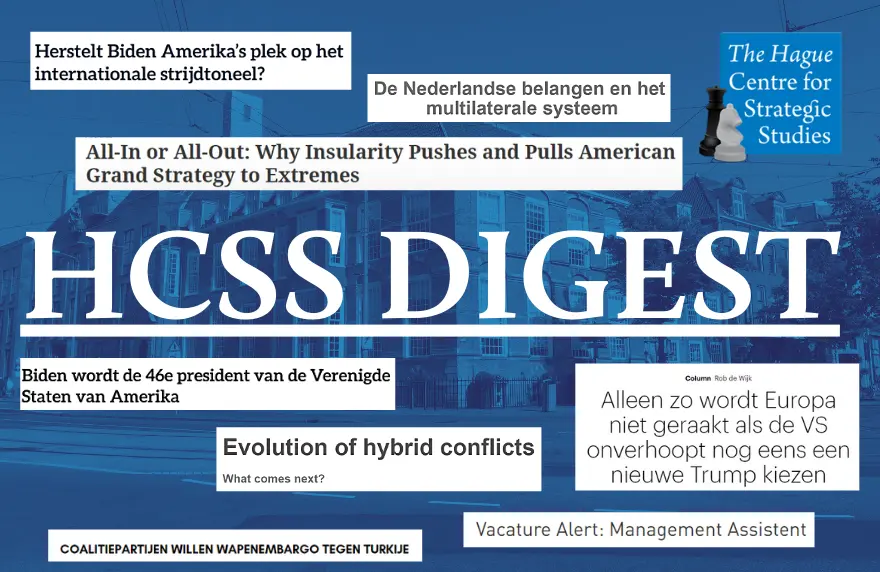The US Elections still dominated the news, but there was so much more to talk about. From webinars to podcasts (and we also have a vacancy!), catch up on the latest in geopolitics and international security issues with the HCSS Digest.
Hybrid threats are one of the main security challenges Western democracies currently struggle with. Countering them remains a demanding task as they continuously evolve due to technological advances and new ways of hybrid campaigning. In an article for Carré, the periodical of the Netherlands Officers Association (NOV), Frank Bekkers, Bianca Torossian and TNO’s Rick Meessen provide some of the most relevant trends and developments that shape hybrid threats, now and in the years to come, and that pose huge challenges for countering these threats.
That same Carré magazine also published Rob de Wijk’s Dutch executive summary of the recent HCSS report on the importance of the multilateral system: De Nederlandse belangen en het multilaterale system – with the complete English report for download here.
It looks like Joe Biden will be the next US President – but not according to Donald Trump? With claims of fraud and impending trials, the current POTUS is not giving up so easily. Han ten Broeke discussed the volatile situation at WNL Vandaag.
China is getting increasingly worried now that ‘lame duck’ Trump is firing top defense officials. What will the election of Joe Biden mean for the future of Sino-American competition in the maritime domain? Join an impressive lineup of security scholars, moderated by Tim Sweijs, and find out all you need to know during our WEBINAR on Monday 16 November.
And to catch up on all you need to know for this webinar, read the article “All-In or All-Out: Why Insularity Pushes and Pulls American Grand Strategy to Extremes” by Senior Strategic Analyst Paul van Hooft in a special issue of Security Studies on maritime competition. Paul argues that insularity – precisely because it ensures US security – leads the US to overextend in other regions or be left with little influence.
The Trump era was detrimental to the US-EU bond. But anyone who thinks Europe has its protective big brother America back, now that Biden is taking the reins, will be disappointed. The world has changed too much in 4 years, according to Rob de Wijk in EenVandaag. “China has risen and America has weakened. Biden has said over and over again that he will make the fight against China his No. 1 priority.”
A narrow victory in Pennsylvania made Biden the winner of the US presidential election. People took to the streets to celebrate the victory. But for half of the United States, the news was a big disappointment. Can the new president bring together a divided America? Data scientist and expert on US politics Paul Verhagen discussed the election results on NPO Radio 1.
Paul Verhagen was also a guest on NPO Radio 1’s Dit is de Zondag, where the topic of conversation was – of course – the US election results. With the race now (almost) over, we hope Paul will finally get some sleep. Though it doesn’t seem likely the Man in the White House has calmed down…
“Democracy is a competition: you can win it, but you can also lose it. If you cannot accept that, then you defy the basic rules of democracy, ”says Han ten Broeke on radio Den Haag FM, commenting on President Trump’s refusal to accept his defeat in the elections.
Trump may be leaving the White House, but Biden will likewise pursue an anti-China policy. There is a good chance that the new president will ask Europe for (military) support. And that poses a considerable dilemma for the EU, says Rob de Wijk on RTL Z – ‘Biden will need Europe to deal with China’.
It is no secret that Trump and international treaties were not a happy combination. Biden seems to be adopting a more conciliatory tone, so can we expect the same in foreign realations? Or does the adage remain ‘America First’ under Biden? Han ten Broeke shared his insights in VPRO’s Bureau Buitenland.
The Agricultural sector is a strategic resource: next Thursday, Rob de Wijk will be a guest at the (digital) Annual Congress 2020 of the Agriculture and Horticulture Association, discussing the pioneering role that the Netherlands plays in the field of agriculture and horticulture, and how it is underused by Dutch politicians.
Several universities in the Netherlands have started to develop approaches for safe cooperation with China, and foreign partners in general, reports University World News. HCSS has published a China-specific Checklist for Collaboration with Chinese Universities and Other Research Institutions, to help assess risks and also focuses on academic freedom and on knowledge transfer issues.
Only by integrating more and developing at lightning speed into a competitive continent can Europe join forces with the US, and curb the influence of China and Russia, Rob de Wijk writes in his weekly column for Trouw.
Several Dutch political parties want the EU to impose an arms embargo against NATO ally Turkey. HCSS defense specialist Peter Wijninga doubts whether such an embargo is sensible, he explained on BNR Nieuwsradio.
Don’t forget to tune in this Sunday morning to the latest episode of De Strateeg on Military Space, featuring our very own Patrick Bolder and Joost Carpay, ESA Program manager at the Netherlands Space Office – listen to it on BNR Nieuwsradio, the BNR app, Spotify and/or Apple Podcasts!
HCSS is very proud to have Lotje Boswinkel join our team as Strategic Analyst this week. Prior to joining, she worked as a trainee at the European Union Institute for Security Studies (EUISS), focusing on the Middle East, the future of war, and the implications of COVID-19 for European foreign policy. Welcome to HCSS, Lotje!
Unfortunately, we also have to say goodbye to Assistant Analyst Kalliopi Terzidou, who’s having her final day at HCSS. Thanks for all your hard work, Kalliopi – your almost singlehandedly managing of the Indian Dutch Cyber Security School was especially impressive!
The #IDCSS2020 officially comes to an end today. Didn’t manage to attend all lectures? No worries! You can now watch the lectures on the HCSS YouTube channel.
And finally….
JOB ALERT: sadly, Angelica Francisco will be leaving us in January to focus on her studies. Therefore, HCSS is looking for a new Management Assistant, so if you know someone that fits the profile (and preferably has the same dance moves), spread the word!




